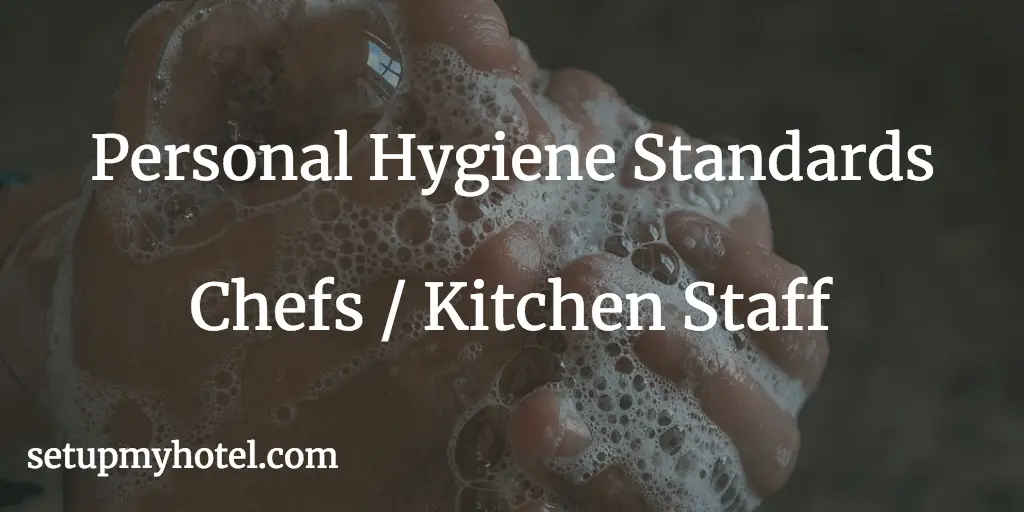Personal Hygiene Standards for Chefs and Kitchen Staffs
Germs carried by people are one of the major sources of foodborne illness hence all restaurant employees or Chefs should maintain good personal hygiene practices to ensure food safety.
The term Hygiene refers to conditions and practices that help to maintain health and prevent the spread of diseases, this sop outlines the standard hygiene policies and procedures that need to be followed by food and beverage production staff eg: Chefs, Food Handlers, Stewarding, etc.
Kitchen Staff / Chef Personal Hygiene Standards:
- Always arrive at work cleanly with clean hair, teeth brushed, and bathed daily with soap.
- Maintain short, clean, and polish-free fingernails.
- Artificial nails are not permitted for any staff in the food production area.
Chefs Policy for Smoking, eating, and gum chewing:
- All kitchen staff should smoke only in designated areas.
- In any case, No smoking or chewing tobacco is allowed in the food production facilities.
- Make sure that you Eat and drink in designated areas only.
- Always use a closed beverage container when drinking water in the F&B production area.
- Kitchen staff should refrain from chewing gum or eating candy during food production.
How to wash hands for Kitchen Staff or Chefs?
- Washing Hands as per the hygiene standards and at the appropriate time is very important.
- The proper method to wash hands includes under fingernails and up to forearms vigorously and thoroughly with soap and warm water for a period of at least 20 to 30 seconds.
- Turn off the water faucets or tap using a paper towel to prevent recontamination of clean hands.
- In addition, hands must be washed at below times or scenarios below:
- While entering the food & beverage production facility before your shift begins.
- Immediately before preparing food or handling equipment.
- As often as necessary during food preparation when contamination occurs.
- Always be in the restroom after using the toilet, and when before you return or enter your workstation.
- WashWash - 1) Brushing or coating a food item with a liquid such as egg white; milk or egg wash. 2) The ... hands when switching between handling or working with raw foods and working with ready-to-eat or cooked foods.
- Wash your hands after touching your face, nose, hair, or any other body part, and after sneezing or coughing.
- Wash your hands after you are cleaning tables, workstations, and cutting boards, or after cleaning duties.
- Between each task performed and before wearing disposable gloves.
- Change disposable gloves as often as hand washing is required.
- Wash hands before and after discarding gloves.
- After smoking, eating, drinking, etc.
- After taking out the garbage, handling any cleaning chemicals, picking up dropped food items, etc.
- Wash hands after any other unsanitary tasks have been performed.
- While washing hands make sure that you wash hands only in hand sinks designated for that purpose.
- Use a hand sanitizer as per the required quantity after washing your hands.
- Always dry hands with single-use towels or a hot air blower.
What should be the proper attire for the Chef / Kitchen Staff?
- All kitchen staff should be wearing appropriate and proper uniforms at all times.
- Clean uniform with sleeves and clean non-skid, close-toed work shoes while on duty.
- Always wear your apron on site, as appropriate.
- Do not wear the apron to and from work.
- Always remember to take off the apron before using the restroom.
- Change the apron if it becomes soiled or stained.
What are the appropriate Hair Restraints and Jewellery for Kitchen Staff or Chefs?
- Always wear a hair net or cap in any food production area that completely covers all hair.
- Keep beards and mustaches neat and trimmed.
- Beard restraints are required in any food production area.
- Refrain from wearing jewelry in the food production area.
- Only a plain wedding ring or wedding band is permitted in the Kitchen.
- No necklaces, bracelets, or dangling jewelry are permitted.
- No earrings or piercings that can be removed are permitted.
What should the Chefs do in case of any Cuts and Burns while working?
- Report or inform the supervisor or sous chef in case of any wounds.
- If you cut a finger, the most important action is to control the bleeding by immediately applying direct pressure to the wound.
- When a burn occurs, it is most important to wash the burn with room-temperature water.
- Consult the in-house hotel doctor for first aid and further treatments.
- Bandage any cut, abrasion, or burn that has broken the skin.
- CoverCover - Cover is the space on the table allotted for table-wares to the guest to consume his/her mea... bandages on hands with gloves and finger cots as appropriate before handling with food.
Training Summary questions:
Q1. What is the purpose of this SOP?
Q2. Why is personal hygiene very important for kitchen staff?
Q3. Explain the proper method of washing hands and the importance of the same.
Q4. Provide a few example scenarios that require washing hands before handling any food items.
Q5. Provide a few examples of standard hair restraints and jewelry for kitchen staff.
Patreon Only SOP Download
SOP Number: Kitchen / F&B Production SOP – 1 Department: Kitchen / Food Production - Staff Personal Hygiene Date Issued: 08-Sep-2018 Time to Train: 30 Minutes












